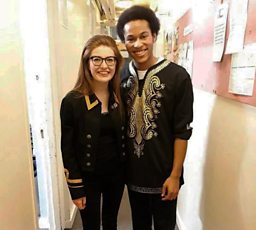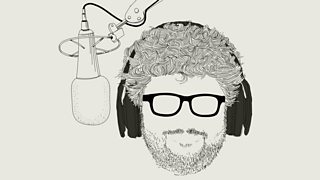From Jacqueline du Pré to Mozart and Bob Marley – the musical world of Sheku Kanneh-Mason.
In Radio 3's This Classical Life, saxophonist and presenter Jess Gillam speaks to award-winning cellist Sheku Kanneh-Mason, who played at the wedding of the Duke and Duchess of Sussex – a performance watched by nearly two billion people. Sheku describes how music, from Jacqueline du Pré to Bob Marley, has influenced every part of his life.
Meanwhile, Jess chooses some musical curios including a two-minute typewriter concerto and an eight-and-a-half hour sleep cycle odyssey!

Sheku’s earliest musical memory is an "unfinished" one
Sheku recalls long journeys made with family listening to Schubert’s Trout Quintet. However, they never listened to the last movement. “We always used to stop after the fourth movement. It was our favourite, so we listened to it over and over and never got to the fifth!”
Jacqueline du Pré can really make you cry within about three notes...Sheku Kanneh-Mason
Jacqueline du Pré was a huge influence on Sheku
Among Shekhu’s music choices is DvoÅ™ák’s Silent Woods for cello and orchestra, with Jacqueline du Pré as soloist and Daniel Barenboim conducting. He says that du Pré's playing “comes straight from the heart to your heart” and can “really make you make you cry within about three notes.” Du Pré’s harmony with her cello prompts Sheku to muse on how abstract it is to play an instrument. “It's not like singing with your physical self, you have an instrument that you have to control. To be able to create something that expressive, that's an incredible thing.”
Mozart was a late student of some musical giants
Mozart’s Mass in C minor is another of Sheku’s choices and one that he says he has, on occasion, listened to “nine or ten times in a row”. Music critic Herbert Glass once wrote that Mozart may have written the Mass because he'd just discovered music from the late Baroque period, including Bach and Handel. “We can't imagine just discovering Bach and Handel now!” says Jess, in shock.
Margaret Bonds is being rediscovered
Troubled Water by composer and pianist Margaret Bonds, chosen by a listener, is based on "Wade in the Water", a jazz standard with its roots in slavery. Bonds wrote her first ever composition aged just five and went on to write for Louis Armstrong and the Glenn Miller Orchestra. Her success turned out to be no guarantor of her legacy. “Unfortunately, lots of her music was lost when she died,” says Jess. However, there are now reports of people finding whole boxes of her scores at book fairs and book sales.
There is a two-minute typewriter concerto!

Leroy Anderson: The Typewriter
Jess Gillam and Sheku Kanneh-Mason are amused by this famous comic ode on office life.
Best known for Sleigh Ride and other light music compositions, Leroy Anderson came up with The Typewriter, a two-minute orchestral piece featuring the sound of two typewriter keys and the carriage return bell. This comic ode to office life looks Monty Pythonesque when it is performed. However, despite its mesmeric quality, as Jess points out, if you listen to it more than once “it could become quite scary”.

Lee "Scratch" Perry was key to Bob Marley’s career
A big fan of Bob Marley and the Wailers, Sheku chooses African Herbsmen as his stand-out favourite track of theirs. Jess noted that legendary producer Lee "Scratch" Perry, whose death was announced just after the show was recorded, had a profound effect on Marley. One of Marley’s sons said that Scratch helped his dad to “look deeper into himself” and that he put Bob “at the forefront and was instrumental in building his father's career".
There’s an eight-and-a-half hour piece of music to accompany sleep
Designed “to be experienced rather than actually listened to”, according to Jess, German-born British composer and pianist Max Richter’s Sleep is an accompaniment to slumber. It recognises that “the brain isn't absent during sleep, but that it's in a different cognitive state.” Richter himself describes it as “a personal lullaby for a frenetic world and a manifesto for a slower pace of life.” For the live versions, the audience lie on sleeping bags or mattresses! Sheku is unconvinced by the idea. “I’d worry about all the snoring,” he says.
-
![]()
This Classical Life: Jess Gillam with Sheku Kanneh-Mason
Jess Gillam and cellist Sheku Kanneh-Mason share the music they love. Mozart takes us to heavenly planes with his Great Mass, Leroy Anderson plays a typewriter, Max Richter sends us to sleep and we'll hear some heart-wrenching cello playing from Jacqueline du Pré in Dvořák's Silent Woods. Plus Bob Marley and Nina Simone.

Compelling listening on Radio 3
-
![]()
This Classical Life
Jess Gillam hosts the music show for people who like classical and other stuff too. Music, eclectic playlists and chat, with a new guest every week.
-
![]()
Classical Fix
The podcast for classical newbies. If you fancy giving classical music a go, start here.
-
![]()
The Listening Service
Rethink music with The Listening Service. Tom Service presents a journey of imagination and insight, exploring how music works
-
![]()
Night Tracks
Discover a world of sound with Radio 3's immersive evening schedule, tailored for late-night listening.





